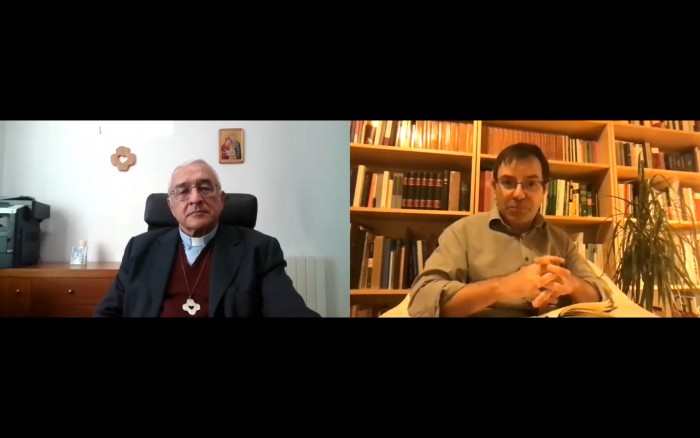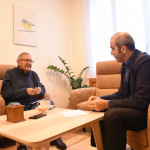For 12 years you led the Congregation of the Dehonians and after finishing your service you have immediately consecrated as bishop of the Diocese Setúbal; since last June you have been president of the Portuguese Episcopal Conference. You have always declared that you want to be a missionary, but you are at the heart of the ecclesial institutions. How do you reconcile mission and institution?
I always wanted to be a priest and missionary. But God has always caught me off guard. I am nostalgic for what I left behind, but I accepted everything without bitterness and never got my head in the various roles I took on. Personally, I would have preferred to go on the mission, but the Pope asked me to be a missionary here in Setúbal. The mission today is in Europe and a challenge for the Church.
Recently you wrote a pastoral note in which you invite Christians to face this time of the pandemic as “a return to the community. Can you explain it better?
Here in Portugal, too, the pandemic is once again exploding. First of all, we must defend life and not put anyone in danger. Even during the lockdown, we have seen that it is possible to live, organize, celebrate the community. The church is not simply formed digitally, but digital creativity has been formidable. And I hope that this remains. But we have to make the community. The church must function as a laboratory of communion, help, sharing and resources.
To overcome the virus we cannot create a social and economic gap. I have been able to see how here in the diocese the major outbreaks have occurred among the weakest groups. We must face the crisis together. We are in the same boat, as Pope Francis says. The Church must open up so that we can understand that we are together and try to face the pandemic together. Otherwise, the future will be difficult for everyone.
In a matter of time, from COVID-19 to the Portuguese parliament, there has been a debate on the subject of euthanasia. How did the Portuguese church react?
The church already on the theme of abortion has acted wisely. It did not make an exercise of strength and power, but it wanted to make us reflect. An important work of awareness was done. Parliament rejected the referendum signed by 100,000 citizens, preferring to act alone. I will never condemn a person who at the limit of hope and to put an end to pain (not so physical) decides to end his life. I will never condemn her, but I stand beside her. What I cannot accept is that society proposes euthanasia as good news and a remedy for people who are at the end of life. Society must stand by and accompany people in helping them find reasons to live. Our country must invest in palliative care and experiment with specialized forms of accompaniment for the terminally ill. Especially in this time of the pandemic, we must stand by the elderly and more fragile.
At the Shrine of Fatima, you wanted to highlight the role of women in the Church. A delicate issue in the ecclesial debate alongside others, such as the fight against abuse and homosexual couples, of which Pope Francis recently expressed his opinion.
I think it is important to understand the spirit of the Gospel, the approach to man and woman. At Fatima, I said that the church must be maternal and paternal. The church in its masculinity reflects neither creation nor the Gospel. At Fatima we celebrated Mary. How can one put the woman out of the house? She is the image of the church and she welcomed Jesus.
If a person is fragile we have to care and accompany. God loves us, and loving us is the source of everything. If we are brothers and have difficulties we must look at each other with love and respect and take care of each other. If judging replaces love, it means that we have not understood the new logic of the Gospel. In debated issues such as the recent one about homosexuality, there are very conflicting positions. I am not worried about that. But we need the church to be a laboratory of humanization.
Last October 4, Pope Francis published the new encyclical “Fratelli tutti”. What should we do?
We need to create an evangelical culture: the culture of a world for all. There are popular movements that present themselves as paladins of values that values are not like not wanting to be contaminated with others, or leaving out immigrants. The Gospel must create culture, an inclusive culture, open to all.
In 2023 the World Youth Day will be celebrated in Lisbon. How are the dioceses preparing themselves? In what spirit should we prepare ourselves?
I start from the experience of my diocese. For the past three years or so, we have been putting youth on the theme, but not in fashion. Parishes complain that they do not have young people, but when do they do? We do not pass the baton. They must become protagonists and responsible in the parish. We must take young people seriously. In the parishes, we are doing the youth council, because they must have a word in the community and the parish council must listen to the youth, and so on the diocesan level. As in a family, young people must have the keys to the house. When do we give the keys of our parish to them? The priest must accompany, be a priest, and leave the organization to the youth.
As for the next World Youth Day, we are doing training courses, in collaboration with the civil authorities. We are convinced that it will be a moment of hope, an experience of universal communion, of sharing the joy of being Christians.





